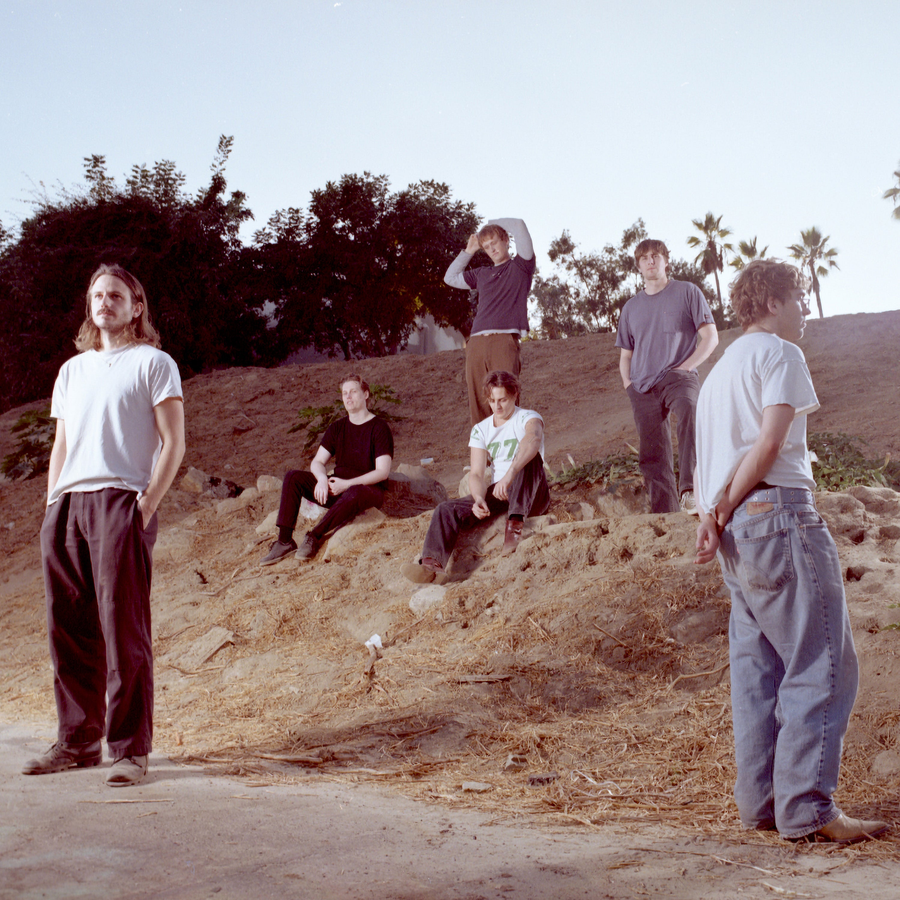Dutch Interior
Contact

Bio
When Jack Nugent, Connor Reeves, Shane & Hayden Barton, Davis Stewart, and Noah Kurtz started making music together as Dutch Interior, the lifelong friends living between houses in Los Angeles and Long Beach had been in and out of each other’s lives for the better part of two decades. The best relationships come easy, and the band is the product of a creative union brought on by already-established trust and familiar insularity. Beginning as a fluid experiment of songs born in the moment, initial recordings Kindergarten and Blinded By Fame trace an uncanny and distinctive world of their own design. You can begin to pick up the separate stylings and personalities of the band members by the songs they independently write before bringing to the band at large, where the tracks often grow into new forms all together. Despite this individual approach to songwriting, they describe each other as “branches of the same core life” whose colliding influences and experience all bleed into the songs.
Describing Sandcastle Molds as a “fucked up Fleetwood Mac song,” Nugent elucidates that “this song grew from the realization, while driving down the 405 after a long night, that I might be losing my edge. Sandcastle Molds deals with holding on to your sense of self as the world descends into madness at a nauseating pace. How does one hold on to hope when the state of all things seems to be in rapid decay?” The band’s music has always been filled with both introspective yearning and outsized emotion and ambition, and the new single refines the band’s genre-less rock music with an undercurrent of compelling melody.
All of Dutch Interior are internalized romantics, enraptured with fragmented moments that appear almost slapdash in their lyrics as well as the naive belief in human connection as the only way to save ourselves. It’s this stark romanticism that makes the music of the band expand outside the confines of the spaces they dwell into something more universally compelling, a manifestation of hope and faith that, together, they can create something bigger than themselves. With influences spanning from ambient to southern rock to jazz to dance music, the band shapeshifts and oscillates between alternative country, sharply hewn indie rock and hints of dissonant ambience, all while still sounding like a band who both speak their own private language and translate it into something universal.
Describing Sandcastle Molds as a “fucked up Fleetwood Mac song,” Nugent elucidates that “this song grew from the realization, while driving down the 405 after a long night, that I might be losing my edge. Sandcastle Molds deals with holding on to your sense of self as the world descends into madness at a nauseating pace. How does one hold on to hope when the state of all things seems to be in rapid decay?” The band’s music has always been filled with both introspective yearning and outsized emotion and ambition, and the new single refines the band’s genre-less rock music with an undercurrent of compelling melody.
All of Dutch Interior are internalized romantics, enraptured with fragmented moments that appear almost slapdash in their lyrics as well as the naive belief in human connection as the only way to save ourselves. It’s this stark romanticism that makes the music of the band expand outside the confines of the spaces they dwell into something more universally compelling, a manifestation of hope and faith that, together, they can create something bigger than themselves. With influences spanning from ambient to southern rock to jazz to dance music, the band shapeshifts and oscillates between alternative country, sharply hewn indie rock and hints of dissonant ambience, all while still sounding like a band who both speak their own private language and translate it into something universal.
Tracks
Tour Dates
- Choosing a selection results in a full page refresh.
- Press the space key then arrow keys to make a selection.
